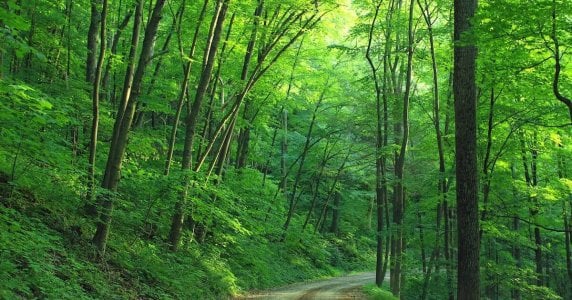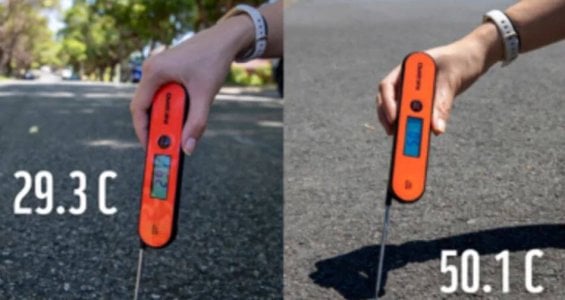Uncover the 'silent killer' lurking in this Aussie suburb with just one innocent detail
- Replies 2
A ‘silent killer’ is running rampant in an unsuspecting Aussie neighbourhood, and the innocent detail revealing this danger may shock you.
Don’t worry, there’s no actual killer on the loose.
But something about these pictures poses a threat that’s equally deadly.
It’s a sunny December afternoon in Toongabbie, a suburb in Western Sydney. Two neighbouring streets have been snapped by Doctors for the Environment Australia (DEA) to highlight an urgent issue – and the image reveals an interesting detail.
The DEA aims to help create the social and political change necessary to address climate change and other environmental issues that affect the health of people across the country. The organisation does this by influencing the public and decision-makers through education, advocacy and campaigning
One street, Bulli Road, is lined with trees, providing an essential source of shade on hot days. But the other road, Favell Road, has barely any canopy coverage.
The difference? A temperature difference of 20 degrees!
With shade provided by the overhead tree canopy, Bulli Road recorded 29.3°C in comparison to Favell Road at 50.1°C.
The ‘one point collection’ is a snapshot of the well-known issues that heat exposure has on health. According to the organisation’s chairperson, Dr Kate Wylie, these impacts were ‘very apparent’ to the medical community.
‘We live in a world where we’re not paying enough attention to heat on human health,’ she said.
‘People are more likely to have heart attacks, kidney failure and strokes when exposed.’
Dr Wylie shared that while awareness of the harmful effects heat has on our body is not new, she explained that simple actions go a long way in protecting our health.
‘Ways we can really do that is by providing shade cover, like planting more trees and not removing ones that are already there,’ she told reporters.
Dr Cybele Dey from the same organisation said that ‘trees can be the difference between life and death’.
‘People are dying from heart attacks and heat exhaustion and from complications of medications at high temperatures is happening on a bigger scale than people realise. It's a silent killer,’ she added.
With so many new suburbs stripped of trees, doctors are concerned people will be left isolated in air-conditioned cocoons.
It's not great for the environment or people’s mental health.
The doctor’s group has teamed up with the World Wide Fund for Nature to highlight the ecological and health benefits of trees.
According to the World Health Organisation, extreme temperature events are observed to be increasing in frequency, duration, and magnitude.
‘Extended periods of high day and night-time temperatures create cumulative physiological stress on the human body, which exacerbates the top causes of death globally, including respiratory and cardiovascular diseases, diabetes mellitus and renal disease,’ the organisation claimed before adding that heatwaves can impact large populations for short periods of time.
However, these instances often trigger public health emergencies and result in ‘excess mortality’.
‘They can also cause loss of health service delivery capacity, where power-shortages which often accompany heatwaves disrupt health facilities, transport, and water infrastructure.’
Tony Matthews, a Senior Lecturer in Urban and Environmental Planning at Griffith University, said: ‘Heat stress actually causes more deaths in Australia than all of the other natural disasters combined’.
‘There are more people who die annually from a heat-related condition, or heat stress-related condition, than from all of the floods, cyclones and bushfires we have in any given year. So, it is a very significant and powerful silent killer,’ he shared in a previous interview.
 What other methods of keeping yourself safe and cool during warmer weather? Share your stories in the comments below.
What other methods of keeping yourself safe and cool during warmer weather? Share your stories in the comments below.
Don’t worry, there’s no actual killer on the loose.
But something about these pictures poses a threat that’s equally deadly.
It’s a sunny December afternoon in Toongabbie, a suburb in Western Sydney. Two neighbouring streets have been snapped by Doctors for the Environment Australia (DEA) to highlight an urgent issue – and the image reveals an interesting detail.
The DEA aims to help create the social and political change necessary to address climate change and other environmental issues that affect the health of people across the country. The organisation does this by influencing the public and decision-makers through education, advocacy and campaigning
One street, Bulli Road, is lined with trees, providing an essential source of shade on hot days. But the other road, Favell Road, has barely any canopy coverage.
The difference? A temperature difference of 20 degrees!
With shade provided by the overhead tree canopy, Bulli Road recorded 29.3°C in comparison to Favell Road at 50.1°C.
The ‘one point collection’ is a snapshot of the well-known issues that heat exposure has on health. According to the organisation’s chairperson, Dr Kate Wylie, these impacts were ‘very apparent’ to the medical community.
‘We live in a world where we’re not paying enough attention to heat on human health,’ she said.
‘People are more likely to have heart attacks, kidney failure and strokes when exposed.’
Dr Wylie shared that while awareness of the harmful effects heat has on our body is not new, she explained that simple actions go a long way in protecting our health.
‘Ways we can really do that is by providing shade cover, like planting more trees and not removing ones that are already there,’ she told reporters.
Dr Cybele Dey from the same organisation said that ‘trees can be the difference between life and death’.
‘People are dying from heart attacks and heat exhaustion and from complications of medications at high temperatures is happening on a bigger scale than people realise. It's a silent killer,’ she added.
With so many new suburbs stripped of trees, doctors are concerned people will be left isolated in air-conditioned cocoons.
It's not great for the environment or people’s mental health.
The doctor’s group has teamed up with the World Wide Fund for Nature to highlight the ecological and health benefits of trees.
According to the World Health Organisation, extreme temperature events are observed to be increasing in frequency, duration, and magnitude.
‘Extended periods of high day and night-time temperatures create cumulative physiological stress on the human body, which exacerbates the top causes of death globally, including respiratory and cardiovascular diseases, diabetes mellitus and renal disease,’ the organisation claimed before adding that heatwaves can impact large populations for short periods of time.
However, these instances often trigger public health emergencies and result in ‘excess mortality’.
‘They can also cause loss of health service delivery capacity, where power-shortages which often accompany heatwaves disrupt health facilities, transport, and water infrastructure.’
Tony Matthews, a Senior Lecturer in Urban and Environmental Planning at Griffith University, said: ‘Heat stress actually causes more deaths in Australia than all of the other natural disasters combined’.
‘There are more people who die annually from a heat-related condition, or heat stress-related condition, than from all of the floods, cyclones and bushfires we have in any given year. So, it is a very significant and powerful silent killer,’ he shared in a previous interview.
Key Takeaways
- Pictures of two neighbouring streets in Western Sydney show a significant temperature difference due to varying tree coverage.
- Doctors for the Environment Australia warns that heat exposure can lead to increased health risks, such as heart attacks, kidney failure, and strokes.
- The organisation's chairperson, Dr Kate Wylie, suggests planting more trees and maintaining existing ones to provide shade cover and protect Australians' health.
- Dr. Cybele Dey emphasises that tree coverage can be hugely beneficial in preventing heat-related health issues, calling it ‘the difference between life and death’.









